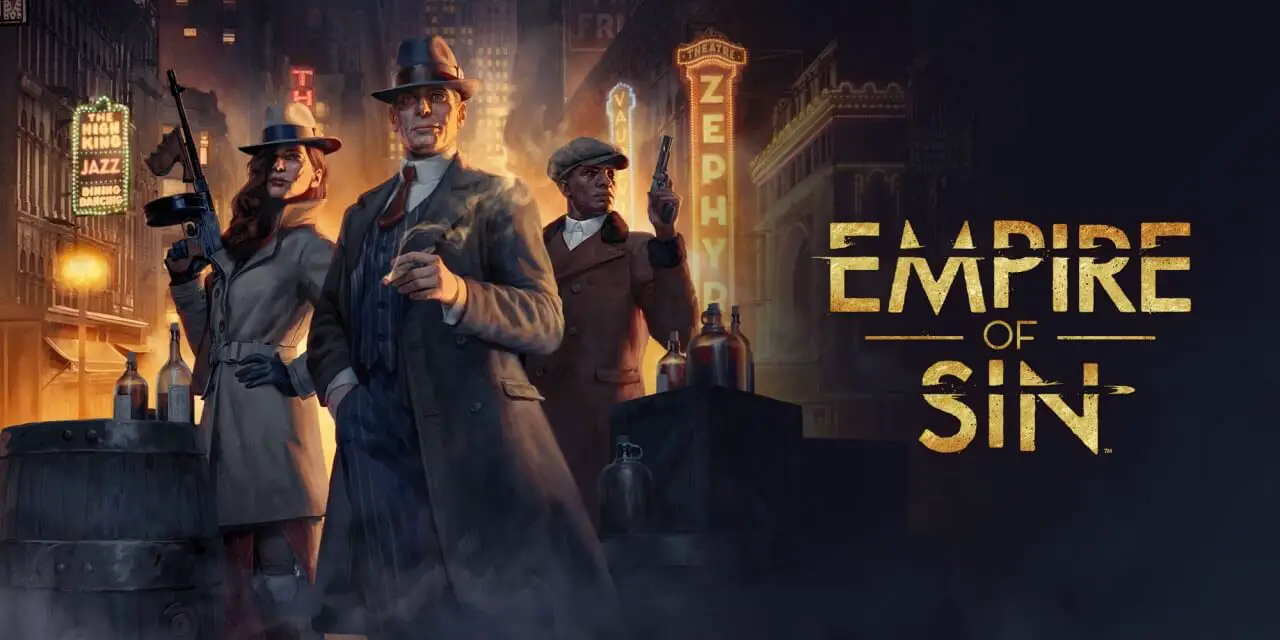Empire of Sin, a game developed by Romero Studios and published by Paradox Interactive, is a hybrid strategy turn-based tactical RPG where you take the role of one of fourteen historical gang bosses in Chicago seeking to gain control of the city’s underworld and fighting off other gangsters – all while staying one step ahead of the law.
Overview
Empire of Sin has a bit of a free-form style. What you are doing at any given moment is driven by what you, as a player believes is important. The game provides some suggestions, in the form of a robust quest system, but it is ultimately you that is pushing towards achieving your overall goal: becoming the kingpin of Chicago. There are three major aspects that you will be managing in pursuit of this: your criminal empire, combat, and relationships with other factions.
Empire management is largely neighborhood-focused, with each one having a number of interacting factors that a player must take into account in order to keep things afloat. The most basic of these is making, sure enough, individuals are continually using your businesses to maintain a profit. There are building upgrades that help with this, and this is reinforced by having a business that produces the kind of alcohol preferred by the clientele in the neighborhood.
Having more people in your business increases your income, and gives you the ability to pay your gangsters and the costs your businesses accrue while leaving enough money to enable for expansion and miscellaneous expenses. The problem of course is that the word of mouth needed to attract customers also increases attention from the police, thus the chance for them to raid you. You can purchase upgrades to decrease the chance of raids, but this will slow down your ability to build up your economic expansion. You also need guards for your businesses to protect against attempts by other bosses to seize your territory.
Each boss has their own pair of economic bonuses that helps differentiate how they approach the economics of the game. These are mostly focused on the upgrade lines that are common among businesses, though some of them provide a raw increase in their overall income for some building types. These are largely related to the sort of criminal enterprises that the historical figure they were based on specialized in, which is a nice touch.
Getting new businesses (called rackets) happens in one of two ways. The first of these is simply buying abandoned buildings that are for sale. This tends to happen only after you have full control over a neighborhood as the other method is generally much more cost efficient. The second method is to take over a building held by someone else. These take-overs are the majority of combat you engage in while playing Empire of Sin, and successfully doing so allows you to get the building for free, though you still have to pay to establish a racket if it is different from the one already in the building.
Combat in Empire of Sin is very reminiscent of the system from X-Com 2, putting it firmly into the X-Com family of turn-based tactical games. You get two actions per character’s turn, with some types of actions, such as shooting a rifle or a machine gun, immediately ending a character’s turn and some simply taking up both of a character’s actions. Available actions are defined by equipment, carried items, and class. The five, or six if you count your boss’s unique class, different classes available provide a variety of different options to take advantage. All characters in the game have one of these classes, which makes it easy to have an idea of what an enemy is potentially capable of, but also narrows enemy variety compared to other games in the X-Com family.
Diplomacy in Empire of Sin is fairly involved and in some ways reminds me of the diplomatic systems in Paradox’s grand strategy titles. You can set up trades, business agreements, and alliances; go to war against a mutual enemy or declare war on a gang you want to formally take down. Convincing other gangs to join in a war against a common enemy allows for you to coordinate on which locations to attack using an interesting marker system. Each boss can also provide trade partners with specific benefits related to their empire bonuses, allowing you to customize your set of bonuses based on the alliances you establish.
The game has a framework of quests that push you forward towards the game’s conclusion, giving you bonuses for doing things besides the street-to-street fights for territory and dominance. Most of these are generated based on conditions in the game and perhaps procedurally generated triggers, each boss has their own separate questline that helps to differentiate them.
Characters are given the option to pick between several different abilities as they level up. These vary based on the character’s class, though there is some overlap. Doctors are focused on healing and status effects, enforcers are high HP characters with a focus on tanking and melee combat, con artists are focused on throwing weapons and some generic abilities, hired guns are focused on damage concentration and mobility, and demolitionists have explosives and defense against explosives. Each boss has their own selection of abilities picked from other classes, with a single ability that is unique to them.
Recruitable gangsters come in five different tiers, with the higher ones requiring an increasingly large amount of money and notoriety to unlock. In exchange, these tend to have higher stat totals with the highest two tiers also featuring special business-related talents. Generally, you will end up steadily increasing the quality of your gangsters over the course of a playthrough, with ones that are no longer directly useful ending up running business rather than serving as core components of your main crew.
Limitations and Flaws
There is a certain sameness to combat encounters that is a bit disappointing. Going through abandoned buildings fighting thugs is a pretty good idea at various points in the game, and after you fight a few of these you lose most potential variance. This is also true of fighting other gangsters. With five base classes, most of the variance is in the type of guards present. This does not provide a lot of variety in combat, and even fighting enemy bosses is not that special since they only have one ability that is really unique to them. While on one hand I understand the choice to do this from an internal consistency perspective, it still leaves the combat encounter side of the game a little bit less engaging than it could have been.
There is a certain sloppiness to Empire of Sin’s combat rules that I also found disappointing. You are able to swap weapons as a free action which makes it so if you do not plan to move there is no reason not to take the unthematic choice of switching to your handgun, spend a single action to shoot with it, and then freely switch back to your more powerful gun for a second action to end the turn. Similarly, sniper rifles require two actions to fire, but only one to set up overwatch with. Thus in rounds where you have to move you are still probably going to get a sniper rifle attack thanks to the overwatch work around. Both of these feel bad, and I hope that they are changed by the Empire of Sin developers eventually.
The biggest flaw is that the game feels more competent than truly special. All of the systems are very functional and effective and generally fun, but they play it a little bit too safe. Class abilities are very similar to what you would expect for a close X-Com 2 spin off, and some appear to essentially have been copied from X-Com 2. The diplomatic system feels like Europa Universalis IV with a bit of a mobster spin, and the economic system is functional but not really surprising or exciting in any way. Maybe it is too much to expect from a Paradox title, but I would have preferred some more risks or attempts to stand out. Instead it is functional and fun, but not exceptional.
Achievements
Empire of Sin is fun. You are constantly given interesting stuff to do, and the fact that they have set up an almost simulation-style world that progresses and changes even without your active intervention is something I haven’t really seen in a game focused as much as this one on tactical turn-based combat. Nothing really pops out as particularly new, but it is engaging and the game had no problem maintaining my interest for extended sessions. Everything fits together very well in a seamless sort of way that shows a lot of care from the design and conceptualization side of things.
The style of the game is great. I loved the bits of character we get from the sit down encounters between your mob bosses, and how the conversations can set the stage for your relationship with the other bosses, while also allowing you to express a bit of the character you want to bring out in the boss you are playing. The music is excellent, and I like some of the small graphical differences they have between neighborhoods to make them feel special and unique. The historical touches were fun, as a Chicago resident I did not know that what is now known as the Navy Pier used to be called the Municipal Pier.
The city map is also really, really well done. The ability to zoom straight from the street level to a neighborhood view to a city view, each with its own distinct information is one of the most impressive user interface’s I have seen in a game in a long time.
Conclusion
Empire of Sin is a good game and if the idea of playing a game where you are a mob boss, fighting in the streets of Chicago for dominance while being heavily involved in the diplomatic, economic, and tactical aspects of these fights appeals to you then I can definitely recommend it. Unfortunately, the reviewer copy included some pretty unfortunate bugs that were frustrating enough that I was not able to play the game as comprehensively as I would have liked, but I am looking forward to these bugs being squashed so I can truly explore some of the finer points of strategy in Empire of Sin.







